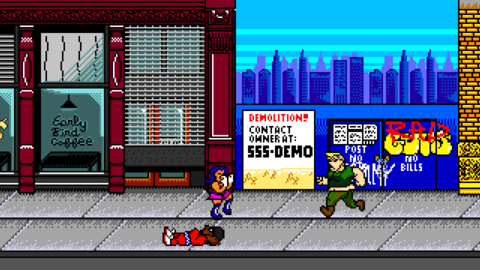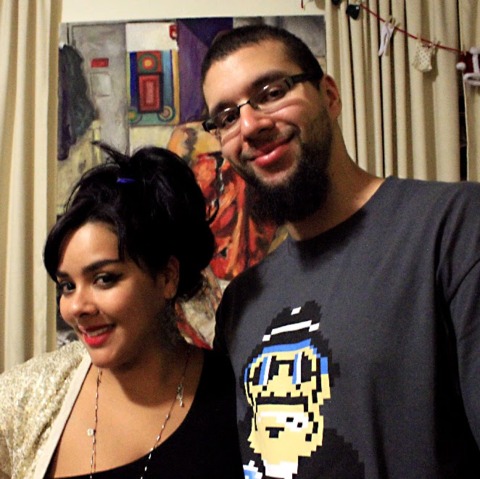As the video game industry grapples with growing up, some uncomfortable conversations are happening along the way, especially in regards to the way games treat gender and race. These topics provoke fiery, impassioned debates about the path forward, even as that path remains unclear.
At IndieCade this year, developer Shawn Allen gave a talk about how black and latino cultures might be the next frontier for independent games.

“I wanted to bring up all the different possible reasons why there aren’t minorities in games,” he said.
What started as a small talk in front of a few of his close friends began to grow, and more and more people started coming off the street and listening to what he had to say. By the end, it was a full house, and he’s been asked to give the talk at other conferences.
Bringing up and talking about race is a complicated topic, and Allen’s own place in the conversation is complex, too. Allen is mixed. His mother is white, while his father is black.
“Race is something is that I always try to avoid, personally, but it’s something that always gets thrown back in my face,” he said.
Allen grew up in New York with his mother, and and the two were on public assistance. He described that path as a “rough way to live.” That’s probably an understatement, but it’s also part of his historical reality.
“I don’t know how anyone could grow up on that without having a really big sense of humor,” he said.
Allen is currently putting the finishing touches on the first episode of his debut independent game, Treachery in Beatdown City. Built on the PlayStation Mobile platform, Treachery in Beatdown City happily mixes elements from classic RPGs, beat ‘em ups, and other nostalgic touchstones. On the surface, the game simply looks like Allen played too much River City Ransom, but there’s more happening beneath the surface, especially because so much of the game plucks from Allen’s personal observations from life.
“It’s trying to create something that’s very personal to me in a very personal space,” he said, “but that also deals with the issues I have with gentrification in the city or entitlement on the streets.”
The game both cribs and mocks the premise for games like Bad Dudes, and asks the question: why would two beefy guys be going after the President instead of the FBI, CIA, or Secret Service? In the case of Treachery in Beatdown City, it’s because the major, loosely based on the very real New York mayor Michael Bloomberg, refuses to use city resources without millions in government aid.

“He doesn’t want to expend city resources trying to save a President, because why should he?” said Allen. “It just reminds me of stuff that goes on in the city all the time.”
So much of Treachery in Beatdown City is pulled from Allen’s own experience. Whenever I’d ask about a specific element in the game, Allen would have an anecdote to share about its origins and why it's there.
One of the enemies, for example, is called CT Punk, based on the “myth of the Connecticut punk, the trust fund baby that comes to hang out in New York.” These are folks who come from wealth, but choose to be poor without accepting all of the realities that come with it, wearing clothes worth hundreds of dollars while simultaneously begging for change to feed their dog.
(There are similar people in San Francisco.)
“C’mon, dude,” said Allen. “You’ve got like $700 worth of stuff on. Why do you have a dog if you’re homeless? This character’s kind of a chickenshit--kicks dirt in your face. He’s the Pidgey of the game, he tries to lower your evade. It brings in the RPG element of it. It’s not just pounding on things, there’s status effects. He lowers your accuracy, so the only real way to deal with him is to grab and punch him in the face.”
Being able to draw on what he’s seen, felt, and lived is key to the game’s authenticity, and that extends to the characters he’s conceiving and writing. One of the main characters is based on his Jamaican friend, another on his Puerto Rican wife. Neither are common racial archetypes for game characters, and Allen is aware of their uniqueness. It’s on purpose, but not simply to be different. It’s because Allen can speak in their voice.
I asked Allen if one of the reasons we don’t see more variety in game characters is due to a lack of diversity in the racial makeup of developers, which means they tend to rely on what they know and see around them.
“That’s a question I got at IndieCade, too,” he said. “A guy was asking me ‘how does a white man write a little black girl?’ I was like ‘you’ve just got to become informed.’ You’ve got to be around it in some way. A show like Living Single or A Different World, these are shows that are pretty much all black casts, but all the people are just people.”
The Walking Dead was a phenomenal game for a many reasons, but its inclusion of a black character as the lead was notable, partially because the game didn’t make a big deal about Lee Everett's race.
“People keep making a big deal about how he’s not like the typical badly written bad guy in games, and he was just a character in the game!" he said, "Yeah, but that’s one of the very reasons, I believe, that people like the game a lot. Because they were like ‘hey, we can talk about this and say he’s a positive black guy!’ [But] who also still ends up being the classic criminal guy, who may have killed somebody, despite being a fairly affable individual who’s smart. It’s like the Boondocks thing, where they talk about how smart you are when you can speak well. Because a black person, if they can speak well, they’re smart. You’re surprised by this. I felt like Lee Everrett surprised people that somebody could actually take time to write a normal person, who also happens to be black.”
I’ve written about these topics before, though typically it’s been about gender. Race, I've found, is harder to talk about. But whether we’re talking about race or gender, one of the first responses to a demand for more diversity in the characters we play is suggesting it will suddenly, unfairly diminish the creativity of creators.
Please enter your date of birth to view this video
By clicking 'enter', you agree to Giant Bomb's
Terms of Use and Privacy Policy
Allen laughed at the idea that we should be too worried about limiting the creativity of modern game stories, given how similar and limited so many of them are currently. (He has a point.)
“Maybe if people took a little bit more time to think about their stories in general, they’d be way better,” he said. “We’ve been talking about recently about how we have this film worship going on in our industry. Our game writing’s still not at blaxploitation level.”
“[As for] injecting minorities into it, I don’t think you should just actively go about doing that,” he said. “For me, my characters--I had to take a step back. I had to say ‘I want to break the mold, so how do I do that?’ Well, I’m going to focus more on a female protagonist. I’m going to have a third, female protagonist, who’s female, who’s Puerto Rican. I’m going to give that over to my wife, who’s an amazing artist, I’m going to have her designer her, and give me feedback on all the sensibilities behind that. I’m going to talk to friends who are familiar [with that] when I want to write her. I’m not going to try and do all that from myself because I don’t necessarily know how a Puerto Rican would react in a situation. I might know my friend, who’s a Jamaican dude, I know him very well. But I know him, so I can include somebody like him. I have my wife. I have my wife’s best friend, and my character will be based on both of them. I have an old, Cuban guy who used to be my boss, I’m going to be basing a character a little bit on the older generation of Latin Americans in this country. I’m trying to build off my personal experience.”
It might be easy to conclude that Allen’s saying it’s impossible for a white game writer to design a game story about the black experience, but it’s not that simple. It’s about writing what you know, and if you don’t know what to write, you do your homework. He pointed to the landmark 1983 film Wild Style, a movie about 1970s graffiti and hip-hop culture. The director, Charlie Ahearn, was white.
"A guy was asking me ‘how does a white man write a little black girl?’ I was like ‘you’ve just got to become informed.’ You’ve got to be around it in some way."
“He went to parties,” said Allen. “He went to places where they were. He starred graffiti artists as the characters in it. [...] He tried to reach into the culture and talk to these people and say ‘hey, I want you to be in this movie.’ He didn’t say ‘I’m going to make some fake documentary about you, I’m going to make a movie that involves all of you and your creative influences.’ Imagine if he’d just made that with people that weren’t creating the stuff. It wouldn’t have been the thing that it is.”
There’s no reasons games can’t do that, too.
It might start by encouraging more people to make games. The more diverse the pool of creators, the greatest set of ideas to pull from. To that end, Allen has started the “YouCan Make Games, Too” initiative. It’s a simple title card, similar to the “Winners Don’t Use Drugs” tagline you saw on games in the 90s. Allen wants this inclusive, positive message to be included in games, hoping to encourage minorities to consider the prospect of making them. It would include a link to a website with more information for budding creators.
“It’s all about trying to empower as many people as are interested in doing that as possible,” he said.
Allen hopes to submit his game to Sony in the next month or so.